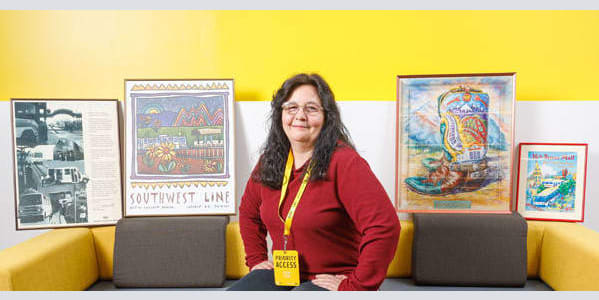
Beverly Castro
For decades, RTD Customer Care’s Telephone Information Center has been a constant for customers, a touchstone when they need help or directions. In seconds, the team’s agents can locate a vehicle, help plan a trip, or recommend travel options that may not have been considered - to name just a few reasons people call. Every conversation is different.
The constant in that busy environment? Bev Castro. The Thornton resident is the longest-serving information specialist in the agency’s history, having joined RTD in this role 33 years ago after leaving Rocky Flats. “I thought I would move around, but I just took a liking to what I was doing, and never moved into any other position,” Castro said.
When your job is to answer the phone, 30-plus years translates to a lot of calls. No one knows the exact number that Castro has fielded, as RTD hasn’t kept such statistics in some time, but she is known to have surpassed 1 million calls over a decade ago. And she has no plans to retire. “I’m just not ready to go yet,” Castro said, chuckling.
Her employment with RTD predates the introduction of rail and myriad special services to the region. As the transit system has grown to encompass more modes of travel, more stops and more service, customer trips have grown more complex, Castro observes. Years ago, she said, “People were taking simpler trips, from here to work, or from here to school. And now, it seems like people are traveling farther. They’re doing more in between.” Smartphones allow customers to carry information in hand, enabling ticket purchases, schedule browsing and access to real-time information – “but they still call,” she said. People often ask her to locate mobile tickets purchased on a non-RTD app such as Uber, or to explain why mobile tickets have expired.
Castro, too, now has all the information she needs on screens – far different from the days when she flipped through stacks of books and schedules to find answers. Having been with RTD for so many years, she said, she doesn’t really have hard calls, in terms of what she is asked to track down. “I know the information,” Castro said. “I have all the information in my head, or I know where to find it. That’s one good thing about being here that long – there are some bus schedules I know off the top of my head.” She knows how the system works.
And while technology has changed, Castro thinks, people have not. “They are not good at adapting to change,” she said. “It may take a while. But once they get used to it, they’ll be OK.”
As RTD has introduced more services, Castro has guided customers through how to add those options to the choices they already had been using. One such example is the agency’s microtransit service, FlexRide, which has grown in use over time – and allows customers to consider bus lines that may not work for them without it. The service gives older people more flexibility to get out of the house, she said: “I’ve talked to a lot of them who are saying it’s their lifeline, their lifesaver. It’s letting them live.”
Castro knows the RTD system from a customer perspective because she is a bus rider herself. She has taken the Route 19 to work throughout the pandemic, on some days the only customer on that trip. “It’s easy for me – and I mean it – when I say, ‘I know how you feel. That’s happened to me before,’” she said. Castro has experienced what it feels like to be passed by because a bus is full.
Her perspective leads Castro to look at the system differently when she is not on it. She finds herself looking at bus stops when she drives around, studying who is waiting at certain places and thinking, “Maybe I talked to you this morning because you’re at the bus stop at the time you said you were going to be.” From one end of town to the other, she said, knowing the landmarks around bus stops makes her job easier. “If somebody says, ‘I’m over here at Colfax and Colorado by the 7-Eleven,’ I know where that 7-Eleven is.”
The questions she answers, Castro said, have not changed much during the pandemic. People continue to ask about what services are running, and they wonder why masks are still required on public transportation when that’s not the case in other places.
The work has taught Castro that she is patient, calm and thick-skinned. She is a good listener, she thinks – a thought that her colleagues quickly affirm. And she doesn’t take her experience home, where her life centers on her husband, two sons and eight grandchildren – and outdoor activities like fishing and camping. “I don’t take things personally, and I take criticism well,” Castro said. “I’ve been called names from A to Z. if you take everything personally that they tell you, you wouldn’t last as long as I did in here.”
Castro’s satisfaction at work remains the same as the day she started: “Helping the people – and getting them to where they need to go the easiest way.”